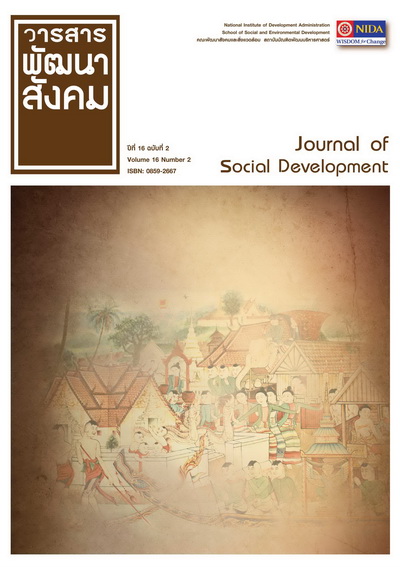การวิจัยเพื่อพัฒนาและประเมิน เครื่องมือวัดพฤติกรรมการคบเพื่อนอย่างปลอดภัยของนักศึกษาปริญญาตรีและความไม่แปรเปลี่ยนของโมเดลการวัด
Main Article Content
Abstract
บทคัดย่อ
นักศึกษาปริญญาตรีซึ่งจะเป็นอนาคตของชาติ สามารถกระทำตนให้เป็นคนดี คนเก่ง และมีสุขได้ โดยการมีพฤติกรรมการคบเพื่อนอย่างปลอดภัย ดังนั้นจึงจำเป็นต้องทำการศึกษาวิจัยและพัฒนาให้เกิดพฤติกรรมดังกล่าวให้มากยิ่งขึ้น เครื่องมือวัดเป็นสิ่งสำคัญในกิจกรรมเหล่านี้ วงวิชาการในปัจจุบันเรียกร้องให้มีการวิเคราะห์คุณภาพของแบบวัดที่เคร่งครัดมากขึ้น แบบวัดพฤติกรรมการคบเพื่อนอย่างปลอดภัยโดยส่วนใหญ่ที่ใช้ในประเทศไทยยังไม่ผ่านกระบวนการวิเคราะห์คุณภาพแบบวัดอย่างครบถ้วน การวิจัยนี้มีวัตถุประสงค์เพื่อแสวงหา ยืนยันองค์ประกอบและโครงสร้างของแบบวัดตลอดจนการศึกษาความไม่แปรเปลี่ยนของโมเดลการวัดพฤติกรรมการคบเพื่อนอย่างปลอดภัยในกลุ่มนักศึกษาปริญญาตรีประเภทต่างๆ ผลการวิเคราะห์องค์ประกอบเชิงสำรวจโดยข้อมูลชุดแรกพบว่า ตัวแปรนี้ประกอบด้วย 4 องค์ประกอบได้แก่ การทำตามเพื่อนในทางที่เสี่ยง การแนะนำเพื่อนให้ขับขี่อย่างปลอดภัย การเตือนเพื่อนให้ระวังตัว และการส่งเสริมเพื่อนด้านอนามัยการบริโภค รวมจำนวน 14 ข้อ และอธิบายความแปรปรวนของตัวแปรนี้ได้ 57.49% เมื่อทำการวิเคราะห์องค์ประกอบเชิงยืนยันแล้วพบว่าโมเดลการวัดนี้มีความกลมกลืนกับข้อมูลเชิงประจักษ์ชุดที่สอง และพบว่าโมเดลการวัดมีความไม่แปรเปลี่ยนของรูปแบบโมเดล (Pattern same) และความไม่แปรเปลี่ยนของน้ำหนักองค์ประกอบ (Factor loading) เมื่อผู้ตอบมีเพศต่างกัน เมื่อทำการวิเคราะห์ความตรงของแบบวัดด้วยข้อมูลชุดที่สาม พบว่า แบบวัดพฤติกรรมการคบเพื่อนอย่างปลอดภัยมีความสัมพันธ์ทางบวกกับแบบวัดพฤติกรรมสุขภาพ แบบวัดการควบคุมตน แบบวัดลักษณะมุ่งอนาคต และแบบวัดการประเมินแก่นแห่งตน ค่าความน่าเชื่อถือของคะแนนจากแบบวัดพฤติกรรมการคบเพื่อนอย่างปลอดภัยเท่ากับ 0.83 แสดงว่าแบบวัดนี้มีคุณสมบัติเหมาะสมเป็นที่ยอมรับได้ และในตอนท้ายของบทความมีข้อเสนอแนะในการใช้แบบวัดนี้ในการวิจัยและการพัฒนา
คำสำคัญ: การวิเคราะห์องค์ประกอบ ความไม่แปรเปลี่ยนของโมเดลการวัด พฤติกรรมความปลอดภัย เพื่อน นักศึกษาปริญญาตรี
Abstract
Undergraduate student who is the next generation of the country can be a good and wise person with happiness in the future from having peer exchange safety behavior. At present, new techniques for demonstrating measurement quality are more rigorous. Scales regarding to peer-related safety behavior in Thailand have not yet been put through complete verification processes. This study aimed at searching, confirming, and investigating emerging factors of a measurement model of peer exchange safety behavior in undergraduate students. Result from exploratory factor analysis using the first data set indicated four-factor model, which were, peer-risk compliance, advising peers for safety driving, warning peers for careful prevention and supporting peers for safety consuming, with the total of 14 items, explaining 57.49% of the variance of this construct. Second-order factor analysis was performed. By employing the second data set, the results showed model fit. Moreover, measurement invariance in terms of pattern same, and factor loadings, were found in the model from different gender. The third data set was used for compute validity which indicated that peer exchange safety behavior was positively and significantly with health behavior, self-control, future orientation, and core self-evaluation. The reliability of this newly constructed scale was 0.83. In the last section, suggestions for using this scale in future study and development were discussed.
Keywords: Factor analysis, Measurement invariance, Safety behavior, Peer, Undergraduate students


